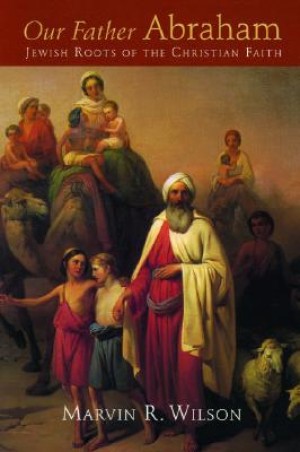'Christians have a lot to learn from Jews'
Sam Hailes
Which book has outsold itself every single year since its publication 53 years ago?

The answer is Marvin R. Wilson’s Our Father Abraham. Reprinted a staggering 26 times, it's even been turned into a two hour documentary. Exploring the “Jewish roots of the Christian faith”, the 300 page study has become the primary reference book for anyone interested in the topic.
Unlike the majority of books exploring Judaism and Christianity, people of both faiths have commended Dr Wilson’s book.
This fact is even more impressive given that Dr Wilson describes himself as an evangelical. Talking about the “curious crossover effect”, the author says he knows of several rabbis who use his book in state universities.
The story began when Dr Wilson was in his early 20s.
Everything that is most important to me as a believer came through the Jewish people.
After an “existential moment” that didn’t appear to be informed by earlier study, the young student had a revelation. “I woke up one day and realised everything that had changed my life, everything that is most important to me as a believer came through the Jewish people: my Lord, my Bible, my value system, my ethics, my understanding of morality and spirituality and worship.”
It was a feeling that was to be backed up biblically. “I believe the roots of Christianity are in Abraham, not really in Paul or Jesus,” he says. “I say that because Galatians 3:29 says, ‘If you belong to Christ you are Abraham’s seed.’ So the moment Christian believers come into the community of faith, they are part of a work that God began with Abraham."
Unable to understand why the Church had historically mistreated the Jewish people, Dr Wilson embarked on a life-long study.
“I set out to find out what had happened. It was not anything taught to me in church so I started doing a lot of reading, befriending some rabbis and inviting these rabbis to lecture on campus.”
Dr Wilson has since organised more than 450 trips to synagogues for his students at Gordon's College, Massachusetts.
“I’ve been doing a lot of listening. As James says: ‘Be slow to speak and quick to hear.’ Or as the rabbis put it: ‘Why did God create human beings with two ears and one tongue? We need to do a lot more listening than we do speaking.’"
What has the church missed?
“A lot of what had gone wrong was that instead of understanding Paul’s teaching in Romans 9-11, that Gentiles had been grafted into a Jewish olive tree, the church instead took largely a posture of supersessionism... proclaiming the Church as taking the place of Israel. The more I read Romans 9 to 11, the more I did not believe that Paul seemed to believe that Israel’s brightest day lay in the future when he said, in Romans 11:25-17, that corporate Israel will yet be saved.”
About to enter his 50th year of lecturing, Dr Wilson comes across as eager and pleased to pass on what he has learned to the next generation.
“99 out of 100 Christians in a local church on Sunday morning do not understand that the first 20 years of the Church you had to be a Jew to get into the Church. It was a movement within Judaism from AD29 to AD49. From the time Jesus left this Earth, the Jesus movement - they are referred to in the book of Acts as 'the Nazarenes', is one of the major sects or groups of 1st century Jews.”
As the gospel began to spread to the Gentiles under the influence of Paul, Dr Wilson believes that Greek and Latin expressions of Christianity began to alter the Jewish foundations for the worse.
When Christianity looks at itself, it’s Hebraic to the core.“It moved Christianity from a faith that focused on how you live and the commandments you keep and a faith that is deeply rooted in justice and love for your neighbour and practical concerns, to more of a dogmantic faith - where not so much how you live but what you believe, is important."
“Theology began to trump lifestyle and practice. As we know, in the Christian faith, both of those are important. Doctrine does lead to good deeds. But Christianity became a lot more airborne, worried about the life to come and seeing salvation in terms other than things that relate to this world.”
Another major change that originated in the 1st century which, according to Dr Wilson, still has implications today, was the leaving behind of Judaism's commentary tradition.
“Rabbinic Judaism was characterised by commentary. By dialogical understanding of truth, asking questions and going back and forth, truth was understood by question and answer. The Church, however, tended to view the truth as system as opposed to commentary - vast logical systems that often came through philosophy minds. You don’t take philosophic grids and impose that on the Bible because [if you do] you’re going to end up doing damage to scripture.”
Ultimately, Dr Wilson sums up by saying: “When Christianity looks at itself, it’s Hebraic to the core”.
Why the Old Testament isn't inferior
Dr Wilson believes that every major doctrine found in the New Testament has to be validated by the Old Testament or “Bible of Jesus”.
“If it’s not in the Hebrew Bible it doesn’t get into the New Testament because the writers of the New Testament cite not the Apocrypha as authoritative or the writings of Qumran or the writings of Josephus but ‘it is written’ and that referred to the Hebrew Bible.”
Dr Wilson says the New Testament writers “further explained” the scriptures in the light of Christ but did not “eliminate” the Old Testament.
“We are semantically preconditioned. When we hear the words 'Old Testament', we think: 'inferior'. When we hear 'New Testament', we think: this has replaced what is junky and old and antiquated. That’s because pastors and teachers don’t take time to explain that 'old' does not mean 'done away with'.”

“The New Testament does not mean 'brand new'. It means a renewed covenant. And it’s the Covenant of Grace that God began with Abraham, renewed with Isaac, Jacob, Moses, David and now once again renewed in the Gospels with the coming of Jesus.
With so much involvement in the Jewish community, has the academic been criticised for his inter-faith work? Dr Wilson doesn’t answer directly, but simply argues that Christians “need to be able to take a seat at the table and converse with the religious other”.
'It is not the Church's responsibility to convert the Jew'
As for converting others to the Christian mindset, Dr Wilson takes an unusual position.
“If people think the only reason we have for talking to another religion is to convert the other, I take the position it is not the Church’s responsibility to convert the Jew. 'Conversion' is not the word. Even Paul the apostle did not have a conversion. Conversion, if you look it up in a dictionary, is the turning away from one religious community and signing up with another community after you turn your back on one religion.”
“Whatever Paul did, he did not have a conversion by leaving Judaism. For Paul, he saw it as the fullest flowering of his Judaism. Not the end of Judaism so he could found a religion called Christianity."
Dr Wilson admits that most Jews today believe that being both Jewish and a Christian is “oxymoronic”. But the writer again points out that, in the first century, all of the early Christians were Jewish. "The Nazarenes were a movement within Judaism."
It’s clear that Dr Marvin’s life’s work has been a fulfilling, interesting and exciting journey. His work has helped inform debate, discussion and dialogue around the world and his passion for the subject has yet to wane. “I believe Jews have a lot to learn from Christians and Christians have a lot to learn from Jews.”
- How well do you know your Old Testament? Do you have a Bible that enables you to cross reference the words of Jesus with their Old Testament origins? Do you have a New Testament reading that markedly changed your view when you related it to the Bible Jesus knew? Tell us.
Latest Blogs

Gifts
Finding Your Symbol of Faith: A Guide to Christian Cross Necklaces
Looking for the perfect symbol of faith? Explore our guide to Christian cross necklaces, from rustic wooden designs and sturdy men's chains to elegant silver pendants.

Gifts
The Best Christian Gifts for Under £20
Looking for a meaningful gift that won't break the bank? Explore our guide to the best Christian gifts under £20, from inspiring journals to beautiful home decor.

Gift Guide
15 Confirmation Gift Ideas for Boys and Girls
Celebrating a confirmation? Discover 15 meaningful gift ideas for boys and girls, from youth Bibles and jewellery to inspiring journals and keepsakes.

Bible
30+ Powerful Quotes About the Bible (For Inspiration in 2026)
Looking for inspiration? Discover a curated collection of the most powerful quotes about the Bible, from famous historical figures to modern theologians and Scripture itself.

Bibles
What is the "Standard" Bible for Christians?
Is there an "official" Bible that all Christians use? We explain the difference between the NIV, KJV, and ESV, and help you find the standard text for your church or personal reading.

Bible
"I Keep Failing to Read the Bible" – 5 Tips to Make the Habit Stick
Do you start a Bible reading plan only to quit a few weeks later? Stop the cycle of guilt. Here are 5 psychological tips and practical changes to help you build a Bible habit that actually lasts in 2026.
